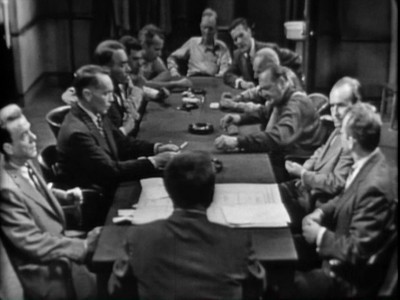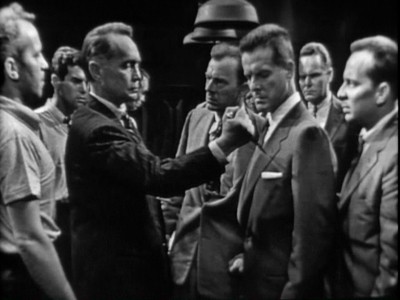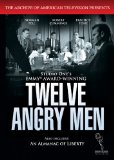| Reviews & Columns |
|
Reviews DVD TV on DVD Blu-ray 4K UHD International DVDs In Theaters Reviews by Studio Video Games Features Collector Series DVDs Easter Egg Database Interviews DVD Talk Radio Feature Articles Columns Anime Talk DVD Savant Horror DVDs The M.O.D. Squad Art House HD Talk Silent DVD
|
DVD Talk Forum |
|
|
| Resources |
|
DVD Price Search Customer Service #'s RCE Info Links |
|
Columns
|
|
|
Studio One - Twelve Angry Men
Entertainment One // Unrated // February 9, 2010
List Price: $19.98 [Buy now and save at Amazon]
 Before it was a big screen classic, before it was a mainstay of the stage, Reginald Rose's "Twelve Angry Men" was a standout episode of the CBS anthology series "Studio One." Broadcast live in September 1954, this was America's first glimpse at what would become a 20th century classic.
Before it was a big screen classic, before it was a mainstay of the stage, Reginald Rose's "Twelve Angry Men" was a standout episode of the CBS anthology series "Studio One." Broadcast live in September 1954, this was America's first glimpse at what would become a 20th century classic.While Rose (who won an Emmy for his efforts here, as would director Franklin Schaffner and actor Robert Cummings) would expand on his script for later adaptations, the shorter original story remains the same: locked away in a hot, hot room, a jury deliberates what appears to be a simple case of murder; things grow complicated when a lone juror refuses to vote "guilty."
It's essentially two stories at once. The first is the murder case itself, involving a teen accused of killing his father; as the jury argues and argues, new facts are revealed, and the evidence - even the eyewitness testimony - begins to fall apart under scrutiny. It's a terrific murder mystery, really, a crafty puzzle, new details revealed at a deliberate pace. We never meet the victim, nor do we see the accused, nor do we witness the crime or its ensuing investigation. The only characters here are the jurors (plus the voice of an off-screen judge in the introductory scene), the only setting the jury room. The audience only gets information as the jurors decide evidence is worthy of discussion - a ploy Rose uses brilliantly, maintaining constant viewer interest in a single-set, talk-heavy, no-action story.
And as a mystery, it's quite a clever one, requiring all the facts to indicate guilt on one level and innocence on another. Rose turns the truth-finding into a team effort, with more jurors offering their own ideas - there's an excitement in the air as the truth unfolds.
The boy, we learn, is Puerto Rican, living in the city's slums, with a criminal past. The jury is all-white. This brings us to the second story, a bold social commentary on race, justice, capital punishment, and groupthink. The court system - probably even the boy's own lawyer - seems to view the case as open-and-shut merely on the grounds of who he is and where he lives. Many of the jurors (whose names are never revealed; how they behave here, as anonymous strangers, is more revealing than names and backstories) assume guilt on those grounds alone, and others decide to vote "guilty" just so they don't stand out.
This is what initially sets off our hero, Juror 8 (Cummings). He votes "not guilty" not because he's convinced of the boy's innocence, but simply because he feels the boy - indeed, any defendant in the U.S. justice system - deserves more than just a rush vote. (Especially considering this is a death penalty case. Should a kid be executed just because a few businessmen wanted to go home early?)
The "angry" factor of the title kicks in when 8 faces off with Juror 3 (Franchot Tone), whose racism and meanspiritedness reveal themselves as deliberations continue. Tensions slowly reach a boiling point. As 3, who can be viewed as the leader of the "guilty" crowd, begins to lose more jurors to 8's side, his fury grows. At one point, 3 threatens to kill 8 (but does he mean it?); at another, 3 holds 8 at knifepoint to reenact the crime, and we nervously wonder where the reenacting ends and real, fiery hate begins.
The slow transition from 8-as-holdout to 3-as-holdout offers familiar themes, especially to the 1950s. Is this a take on the blacklist, or on conformity, or on race relations and inner city woes? Perhaps. Rose's teleplay is wondrously complex, squeezing social jabs into every corner he can find.
But most of all, it's precisely what it appears to be at first glance: a tribute to the U.S. Constitution, the rights it guarantees, and the justice system that lives under it. 8 stands firm because he feels all Americans have the right to a fair trial, something he doubts the defendant received. "Twelve Angry Men" is, at its essence, a tribute to the phrase "reasonable doubt."
That's a lot to fit into a single hour of dramatic television, yet the teleplay is so detailed, and Schaffner's direction so airtight, and the performances so smartly executed, that we're captivated for the entire sixty minutes. The cast gains an energy from the live setting, producing an in-the-now feel that adds to the tension. Cummings, like Henry Fonda after him, is perfectly suited for the role of mild-mannered 8 - he seems the last person to lead a revolt, yet the first person to stand for what's right.
Rose went on to write for "Playhouse 90" and "The Twilight Zone" before creating the TV series "The Defenders," based on a script he created for "Studio One." He then penned a handful of war films, including "The Wild Geese" and "The Sea Wolves." But his masterpiece will forever remain "Twelve Angry Men." And this "Studio One" presentation is a stunning first draft, as potent a drama as the film and play that followed.
 The DVD
The DVDLong thought lost, a complete 16mm print of "Twelve Angry Men" was found only a few years ago. The episode now comes to DVD thanks to E1 Entertainment and the Archive of American Television. The version presented here runs 50:30, missing the original "Studio One" host segments and live commercials, but otherwise appears to be complete.
Video & Audio
We can blame the episode's "long lost" nature for the problems inherent in its 1.33:1 full frame transfer, which features both film scratches and dust from the original kinescope and what appears to be occasional videotape warping. The image is also quite soft, as is to be expected from vintage live television; detail is so-so at best, with no real depth in the darker levels of the black and white photography. All that said, there's never anything here that makes the image unwatchable, and in its best moments it looks about as half-decent as any other Golden Age program I've seen.
The mono soundtrack also repeats the same problems you often find on such vintage programs, namely a definite softness to the track, accompanied by an obvious tape hiss. It's all passable, though. One scene features a damaged track, with multiple instances of half-second (give or take) audio drop-out; I'm not sure if this is a fault of the 16mm source or a sound board error recorded live during broadcast. Optional English subtitles are included.
Chances are, if you're grabbing this one, you know the sort of look and sound you're expecting, and "Twelve Angry Men" delivers right about at that level.
Extras
More of a second feature than an extra, "An Almanac of Liberty" (59:19) is a second episode of "Studio One," also written by Rose (and presented here uncut, with the full "Studio One" intros and commercials). It's a nice companion piece to "Twelve Angry Men" mixed with fantasy elements straight out of "The Twilight Zone," in which residents of a small town discover they've forgotten the points behind the Bill of Rights. Quite preachy and never subtle, "Almanac" is worth watching for its biting commentary about the "land of the free."
A promo for a "Studio One" box set (which includes, oddly, "Twelve Angry Men") plays as the disc loads.
An impressive 16-page "reference guide" packaged within the keepcase includes several essays covering both episodes, including two commentaries written by Rose that were originally printed in a 1956 collection of his scripts.
Final Thoughts
One of the great stories - of any medium - of the 20th century, "Twelve Angry Men" is just as potent in this banged-up "Studio One" edition as it is in all the translations that followed. Provided you won't complain about the transfer problems, this is most certainly Recommended.
|
| Popular Reviews |
| Sponsored Links |
|
|
| Sponsored Links |
|
|
| Release List | Reviews | Shop | Newsletter | Forum | DVD Giveaways | Blu-Ray | Advertise |
|
Copyright 2024 DVDTalk.com All Rights Reserved. Legal Info, Privacy Policy, Terms of Use,
Manage Preferences,
Your Privacy Choices | |||||||















